To boost your neighborhood’s safety, start by understanding common risks like theft or vandalism and build strong community bonds through events and communication. Enhance security at home with good locks, cameras, and lighting, and promote responsible behavior among residents. Use technology such as surveillance drones and safety apps to stay alert. Organize patrols, meet regularly, and stay informed about local crime trends. Keep exploring these strategies to create a safer, connected neighborhood.
Key Takeaways
- Conduct risk assessments and stay informed on local crime patterns to proactively address neighborhood safety concerns.
- Strengthen home security with locks, alarms, cameras, and outdoor lighting to deter potential threats.
- Build community connections through events and communication to foster trust and facilitate neighborhood watch efforts.
- Utilize technology like surveillance drones and safety apps for real-time monitoring and quick alerts.
- Organize regular patrols, meetings, and education programs to promote vigilance and responsible neighborhood behaviors.
Understanding Common Neighborhood Risks
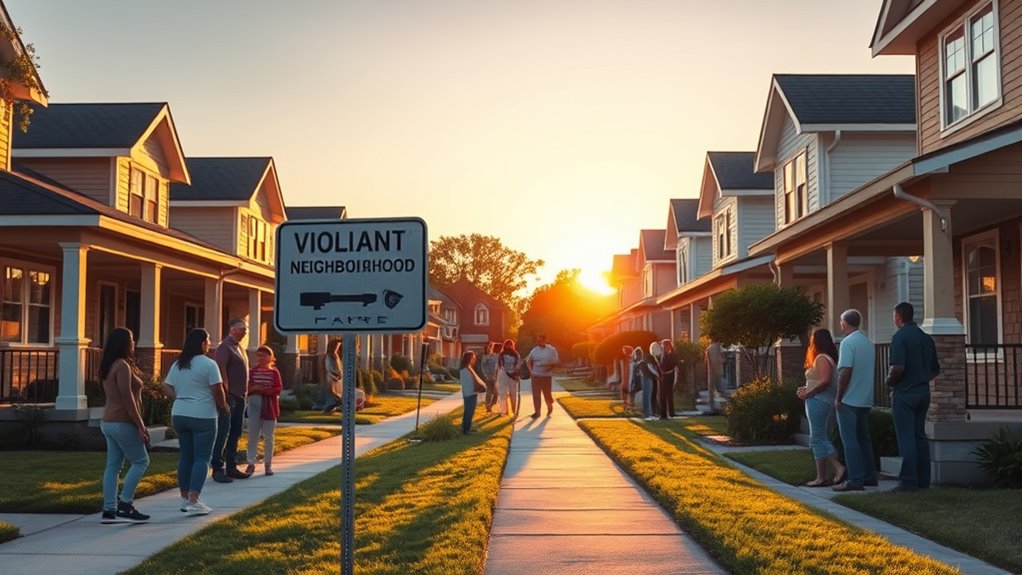
Understanding common neighborhood risks is essential for keeping yourself and your property safe. By performing a thorough risk assessment, you can identify potential threats like theft, vandalism, or natural hazards that may affect your area. Recognizing patterns of crime prevention can help you implement effective measures, such as securing entrances, installing lighting, or using surveillance cameras. Stay aware of local crime reports and neighborhood trends to better comprehend vulnerabilities. Knowing which areas are more prone to certain risks allows you to take proactive steps to protect yourself. Regularly evaluate your surroundings and update your safety strategies accordingly. Being vigilant and prepared ensures you can minimize dangers and create a safer environment for you and your neighbors. Incorporating an understanding of projector contrast ratio can also help you select better visual setups for community centers or local event spaces, enhancing safety and communication.
Building Strong Community Connections
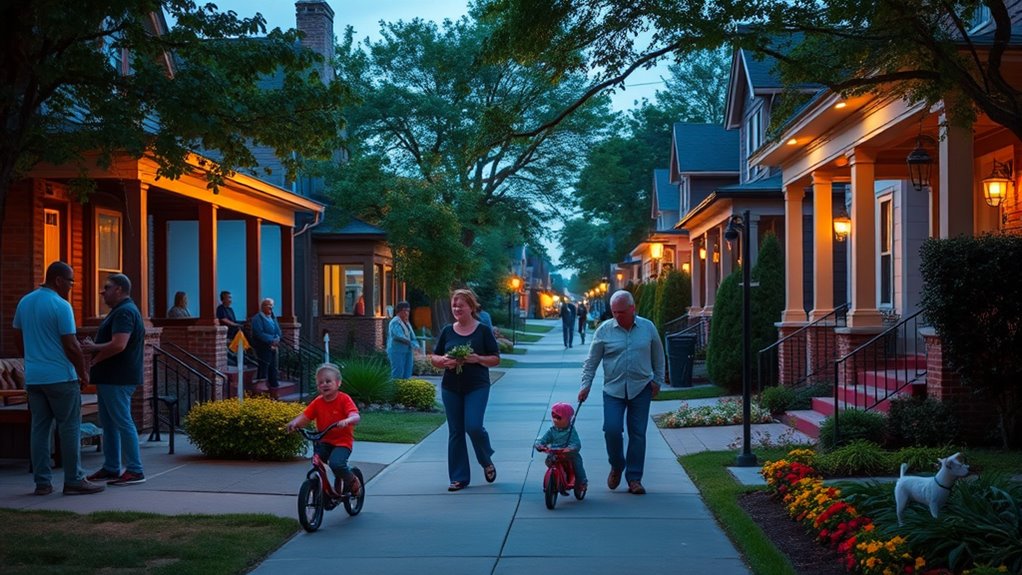
Building strong community connections is a pivotal step in enhancing neighborhood safety because it fosters trust and cooperation among residents. Hosting events like a block party encourages neighbors to meet and build relationships, creating a sense of unity. When neighbors know each other, they’re more likely to notice and report suspicious activity, strengthening neighborhood watch efforts. Additionally, developing these connections supports emergency preparedness; neighbors can organize plans, share resources, and assist each other during crises. A connected community communicates more effectively, making it easier to respond swiftly to emergencies. By fostering trust through regular interactions like block parties and collaborative planning, you help create a safer, more resilient neighborhood where everyone looks out for one another. Incorporating community engagement strategies can further amplify safety initiatives and build lasting bonds.
Improving Security Measures at Home

To improve your home’s security, start by reinforcing entry points like doors and windows to make forced entry harder. Installing security systems, including cameras and alarms, can give you peace of mind and quick alerts to suspicious activity. Additionally, enhancing outdoor lighting around your property can eliminate dark spots and deter potential intruders. Considering a professionally monitored system can also provide long-term security benefits and peace of mind.
Reinforce Entry Points
Securing your entry points is one of the most effective ways to enhance your home’s safety. Start by regularly maintaining locks; well-maintained locks ensure they function properly during emergencies. Reinforce windows with security film or bars to prevent easy break-ins. Check for weak spots and upgrade vulnerable areas. Consider adding deadbolt locks to exterior doors for extra protection. Use window reinforcements like braces or security film to make break-ins more difficult. Properly maintained locks and reinforced windows act as strong deterrents. Incorporating emotional intelligence and awareness of surroundings can further improve overall security and response readiness.
Install Security Systems
Enhancing your home’s security isn’t just about reinforcing entry points; installing an all-encompassing security system adds an extra layer of protection. An effective system includes features like alarm systems and surveillance cameras to deter intruders and alert you to suspicious activity. Consider these options:
- Wireless alarm systems for easy setup
- Surveillance cameras with remote access
- Motion detectors to identify movement
- Door and window sensors for added security
- Smart home integration for convenience and control
A comprehensive security zone can help coordinate all components for optimal protection.
Enhance Outdoor Lighting
Improving outdoor lighting is a simple yet effective way to boost your home’s security. Installing solar lighting along walkways, driveways, and around entry points provides consistent illumination without increasing energy costs. Consider motion sensors for added safety—these activate lights only when movement is detected, startling intruders and alerting you to activity outside. Solar lighting with motion sensors is easy to install and eco-friendly, making it a practical choice. Proper lighting removes dark spots where burglars could hide, while well-lit entrances deter unwanted visitors. Regularly check and maintain your outdoor lighting to guarantee everything functions properly. Utilizing outdoor lighting accessories such as timers and smart controls can further enhance security and convenience. By enhancing your outdoor lighting with these smart features, you create a safer environment and give yourself peace of mind.
Promoting Responsible Neighborhood Behaviors
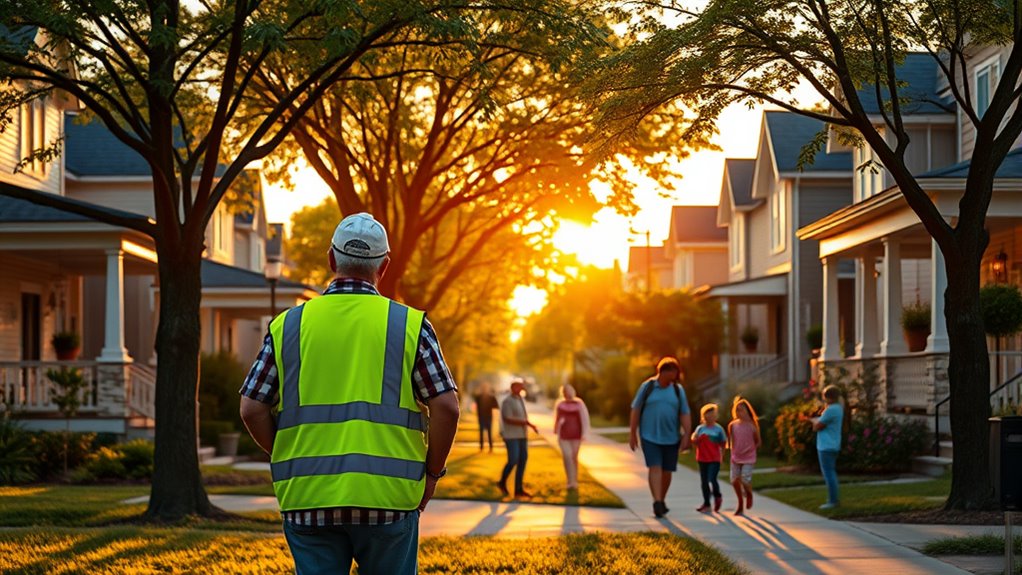
Promoting responsible neighborhood behaviors starts with each resident understanding their role in maintaining safety and fostering a sense of community. You can encourage positive habits that protect everyone by organizing community patrols and strengthening neighbor communication. These efforts create a vigilant environment and build trust among residents. Incorporating community safety strategies can further enhance neighborhood protection. Consider these actions:
- Participate in or organize community patrols to deter suspicious activity
- Communicate regularly with neighbors about safety concerns
- Keep an eye out for unfamiliar visitors or unusual behavior
- Respect property boundaries and report vandalism
- Support neighborhood watch initiatives and attend meetings
Utilizing Technology for Safety
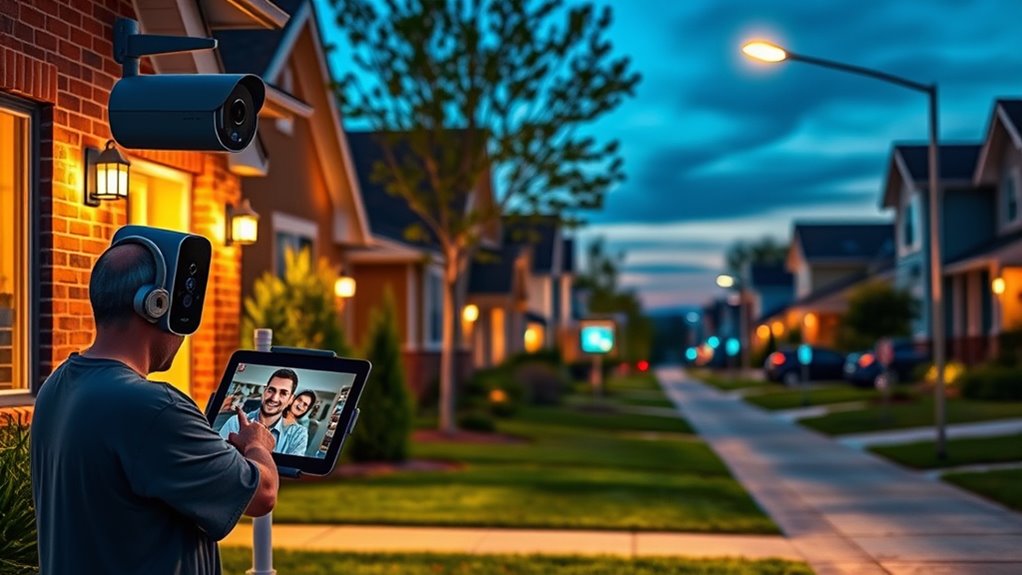
Leveraging technology can considerably boost your neighborhood’s safety efforts. Surveillance drones offer real-time monitoring, helping you quickly identify suspicious activity or emergencies from above. They can cover large areas efficiently and provide valuable footage for authorities. Mobile safety apps are another essential tool, allowing residents to alert neighbors or authorities instantly if they notice anything unusual. These apps often include features like emergency buttons, location sharing, and community alerts, enhancing communication within your neighborhood. By integrating surveillance drones and mobile safety apps into your safety plan, you create a more proactive approach to security. Utilizing technology not only deters potential troublemakers but also ensures help arrives faster when needed. Legal guidelines also play a role in understanding the extent of surveillance and safety measures permissible within your community. With these tools, your neighborhood becomes a safer, more connected community.
Organizing Neighborhood Watch Programs
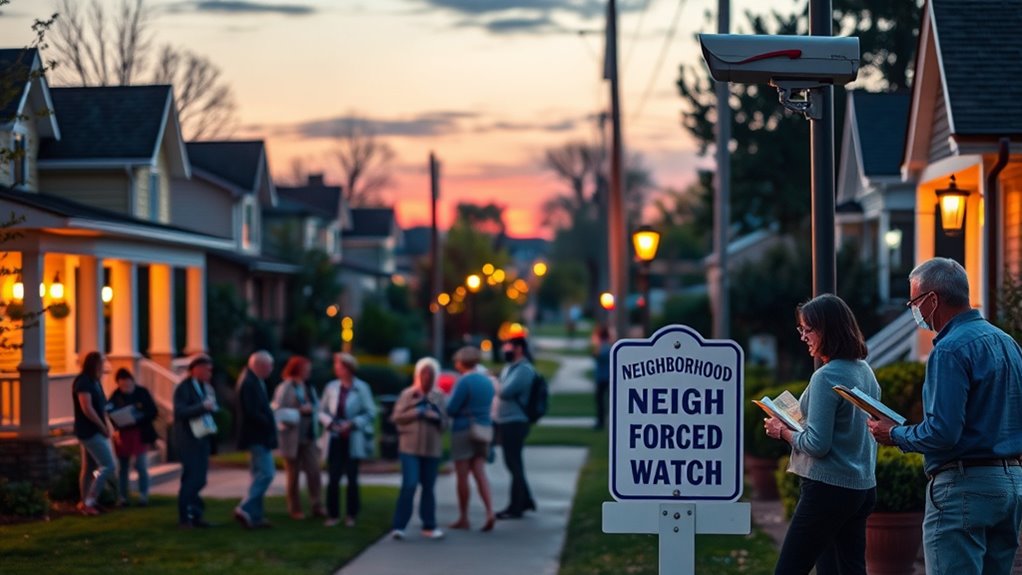
Organizing a neighborhood watch program is one of the most effective ways to enhance local safety. You can start by gathering neighbors interested in community patrols and establishing clear communication channels. Hosting safety workshops encourages residents to share concerns and learn crime prevention tips. To succeed, consider these steps:
Organize a neighborhood watch with community patrols, safety workshops, and active communication for a safer neighborhood.
- Form a core group of committed volunteers
- Coordinate regular patrols and meetings
- Use social media or messaging apps for updates
- Invite law enforcement to conduct safety workshops
- Promote awareness through flyers and community events
- Recognizing the importance of attention in creating a focused and proactive safety environment can significantly improve community engagement and response.
Frequently Asked Questions
How Can I Effectively Communicate Safety Concerns to Neighbors?
You can effectively communicate safety concerns to neighbors by attending community meetings and sharing your worries openly. Use safety signage around your neighborhood to highlight specific issues, making it easier for everyone to recognize and address them. Engage with neighbors regularly, listen to their concerns, and collaborate on solutions. Clear, consistent communication helps foster a safer environment and encourages everyone to stay vigilant and proactive.
What Are the Legal Considerations for Neighborhood Surveillance?
You need to guarantee legal compliance and respect privacy rights when setting up neighborhood surveillance. Check local laws on recording and monitoring, as some areas require consent or have restrictions on video cameras. Avoid intruding on private spaces like neighbors’ yards or homes. By understanding these legal considerations, you protect yourself from potential disputes or legal issues, while effectively enhancing neighborhood safety without infringing on privacy rights.
How Do I Involve Children in Neighborhood Safety Practices?
You should teach children about child safety and how to recognize and report suspicious activity to boost neighborhood awareness. Encourage them to stay alert, avoid sharing personal information, and stick with trusted adults when outside. Involve them in neighborhood watch activities, like walking with neighbors or participating in safety drills. By empowering kids, you help create a safer environment, and they learn the importance of being aware and responsible in their community.
What Funding Options Are Available for Community Safety Initiatives?
Imagine unfastening the door to safer neighborhoods—funding makes it possible! You can explore grant opportunities and community grants designed specifically for neighborhood safety initiatives. These funding options are like keys that open doors to resources, training, and equipment needed to enhance safety. Reach out to local government agencies, community foundations, and non-profits. By leveraging these funds, you empower your community to work together and create lasting safety improvements.
How Can I Handle Disputes Related to Safety Measures?
When handling disputes over safety measures, you should focus on mediation strategies and conflict resolution. Start by listening actively to all parties involved, ensuring everyone feels heard. Encourage open dialogue and find common ground. If needed, bring in a neutral mediator to facilitate the discussion. Keep the conversation respectful, and aim for solutions that address everyone’s concerns, fostering cooperation and maintaining neighborhood harmony.
Conclusion
By weaving these safety threads together, you create a sturdy fabric of neighborhood security. When you stay aware, connect with neighbors, and embrace technology, you’re planting seeds that grow into a thriving, protected community. Think of your efforts as guiding stars illuminating the path to safety. Together, you and your neighbors can turn your neighborhood into a fortress of trust and care, where everyone feels safe to live, grow, and flourish under the watchful sky of shared responsibility.










